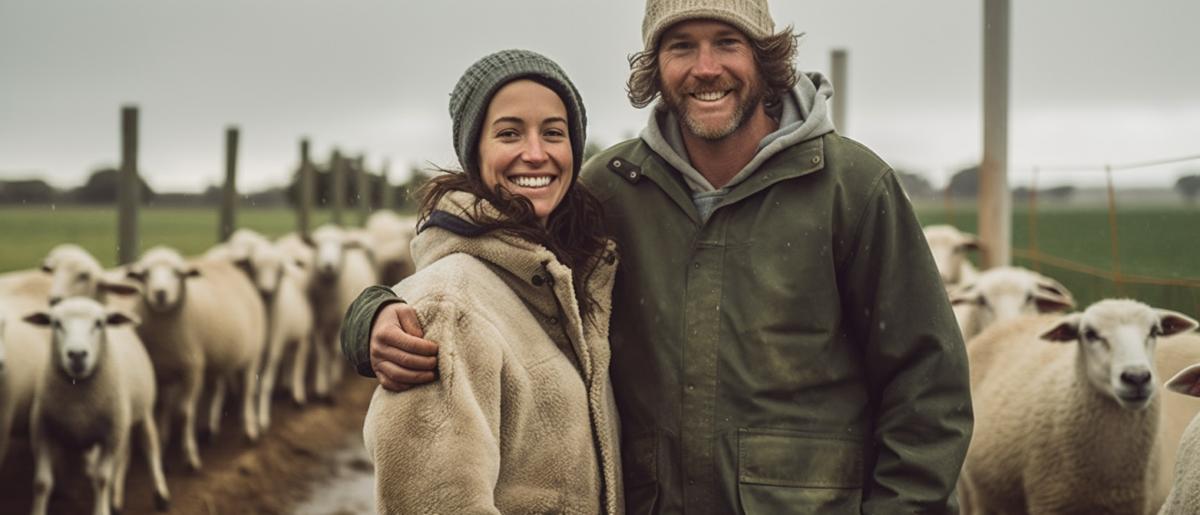

Navigating the challenging landscape of sheep farming in Australia may, at times, require a financial boost. This support can often arrive in the form of business loans, a key enabler for sheep farmers seeking to develop their enterprises. Implementing innovative agricultural techniques, procuring advanced breeding stock, or simply sustaining operations through fluctuating wool and meat markets can all be made possible through judicious financial strategies. Business loans present a valuable opportunity for sheep farmers to access funds necessary for such endeavours. As the Australian agricultural sector continues to grow, business loans are becoming an essential tool for sheep farmers. These financial aids allow for the advancement and maintenance of livestock operations, reinforcing the stability and competitiveness of the nation's agribusiness. From daily operational expenses to long-term investments, business loans are proving to be a pillar of support, boosting the potential of sheep farmers in Australia. This highlights their crucial role in the industry. It's never just about surviving today’s challenges, but creating a robust and sustainable future for the farming business.
Compare over 40+ lenders with one application.
Sheep farming holds an integral position in the Australian economy. This traditional agricultural industry has shaped the nation's progression and identity, weaving a rich tapestry into Australia's historic and cultural fabric. The prominence of sheep farmers in Australia is embodied in the sheer volume of sheep population, which stands at around 70 million. The ratio of sheep to humans is approximately three to one, highlighting the density of this livestock branch. Contribution to the economy is a significant point of discussion when evaluating the importance of sheep farming. With the production of wool and meat, sheep farming serves as a robust engine that stimulates economic vitality. Valuable export products such as fine Merino wool, lamb, and mutton syphon considerable income into the country, fortifying the nation's international trade stature. Sheep farming is a lifeline for rural communities, offering employment and supporting the livelihoods of thousands of Australian families. Beyond economic provisions, sheep farms help to maintain the quinessential rural landscapes. They play a crucial role in nurturing biodiversity, preserving soil health, and contributing to environmental sustainability. The international reputation and prestige of Australian wool and sheep meat also add to the country's cultural significance. Many globally renowned chefs prefer Australian lamb for its superior taste and quality. The intertwined relationship between sheep farming and Australia is complex and profound. Considering the overarching economic, cultural, and environmental impacts, the importance of sheep farmers in Australia should not be underestimated. They are indeed an intrinsic part of what makes Australia.
Learn about eligibility and how to apply.
In Australia's robust agricultural sector, sheep farming plays a critical role. However, Australian sheep farmers confront a unique set of challenges. Many of these issues stem from unpredictable weather patterns and natural disasters. Australia's harsh climate, characterised by extreme heat, droughts, and flooding, can lead to substantial livestock losses and crop failure. Sudden fluctuations in weather patterns can cause significant harm to sheep farmers' infrastructure too, including pastures, water resources, and fencing. Pests and diseases too pose a hefty burden. The invasion of pests, such as wild dogs, rabbits, and kangaroos, often lead to loss of livestock and crops. Apart from this, sheep are susceptible to various diseases, including footrot and flystrike, significantly impacting productivity and income generation. Market volatility is yet another challenge with sheep wool and meat prices tend to fluctuate heavily based on global demand and supply. These unpredictable swings can create uncertainty and cash flow issues, making it difficult for sheep farmers to plan for the future and make necessary investments. Lastly, issues around labour scarcity and high operating costs, including feed, veterinary services, shearing, transport, and farm machinery, can also make it tricky for sheep farmers to turn a profit. These difficulties underline the crucial role of financial flexibility in the farming industry. Business loans can be a game-changer here, assisting sheep farmers to navigate these turbulent times and emerge stronger.
Calculate your repayment estimates and more.
Peering into the realm of business loans, it's evident that they provide a lifeline for sheep farmers, particularly when geared towards addressing specific agricultural challenges. Ready access to capital through these financial instruments can seed success in numerous ways for these businesses. For instance, a loan can finance the acquisition of cutting-edge shearing and wool processing machinery, reducing the reliance on manual labour. Thus, boosting productivity and output, and cultivating a more competitive business. In addition to machinery upgrades, a business loan can act as a financial bulwark against the unpredictable nature of farming. Seasonal changes, fluctuating market prices for wool, and unexpected livestock diseases can inflict substantial stress on a farm's financial health. A business loan can help navigate these shoals, providing funds to buffer against such unforeseen setbacks. Having a business loan at the ready ensures the continuity of the farm's operations and sustainability in even the most awkward of circumstances. Pointing our gaze at long-term development, business loans can serve as the engine of growth and expansion for sheep farming enterprises. They make it possible for these businesses to acquire more land, diversify into other livestock or agricultural products, or even harness new marketing strategies to reach a broader customer base domestically and overseas. The resultant growth not only boosts the farm's profitability, but also fortifies its role in supporting Australia's economy and food supply chain. Hence, business loans unquestionably stand as an invaluable resource for sheep farmers.
In Australia, sheep farmers can access a variety of business loans to support their operations. These include agriculture-specific loans tailored for farming businesses, equipment finance for much-needed machinery, and working capital loans for everyday expenses optimisation. Each loan type offers unique advantages to cater to specific financial needs.
There are several types of business loans in Australia that can benefit Sheep Farmers. Each of these loan types has its unique features, advantages, and potential disadvantages. Here are some of the most common types of business loans for Sheep Farmers:
Line of Credit
A line of credit offers a flexible facility for sheep farmers in Australia to borrow and pay back, only paying interest on the amount used. It can cover unexpected costs or take advantage of sudden opportunities.
Business Overdraft
Just like a personal overdraft, a business overdraft attaches to the business bank account, with a limit farmers can draw from when funds fall short. This can be crucial during slow seasons or sudden price elevations.
Loans for Equipment & Machinery
These loans help farmers in their crucial acquisitions such as the latest shearing tools or new farming vehicles. As it involves large investments, these loans are usually long term and can sometimes use the equipment itself as collateral.
Unsecured Business Loans
These are short-term loans that do not necessitate the farmer to put forward any collateral. This might be a suitable option for those with a solid business plan but lacking in assets.
Chattel Mortgage
This type of loan allows sheep farmers to secure finance for mobile or immovable farm assets, such as tractors or infrastructure upgrades. The loan is secured by the asset itself, similar to a home mortgage.
Invoice Financing
For farmers selling wool or meat to clients under terms, unpaid invoices can constrain cash flow. Invoice financing helps by advancing a percentage of the invoice total, alleviating cash flow problems.
Business Credit Card
For smaller scale costs or regular expenses, a business credit card can be a sound solution. It also offers benefits like expense tracking and rewards programmes.
Merchant Cash Advance
This is a financing method for businesses that have significant transactions through a card payment facility. It allows sheep farmers to get an advance on their future card sales.
Trade Finance
For sheep farmers involved in international trade, this lending facility helps manage risks associated with trading across borders by filling in gaps in the trading cycle.
Commercial Property Loan
For farmers looking to purchase, extend, or renovate farm facilities, commercial property loans can be an excellent choice - these loans are secured by the farm property itself.
Business loans can advance the operations of Australian Sheep Farmers in notable ways. They help procure enhanced farming equipment, bolster animal health management techniques, and aid in property expansion efforts. These financial solutions provide a much-needed resource for sustaining and improving agricultural practises.
Here are some common reasons Sheep Farmers use business loans:
Buying Livestock
One of the primary uses of business loans in the sheep farming industry is to purchase livestock. Especially during breeding season, farmers require a substantial fund to expand their herds, improve their genetics, or replace lost stock.
Investing in Feed and Supplements
Maintaining the health and productivity of a flock requires a constant supply of quality feed and nutritional supplements. A business loan can be utilised to purchase these necessities in bulk, saving costs in the long run.
Upgrading Farm Infrastructure
Business loans allow sheep farmers to make significant improvements to their farming infrastructure. This includes constructing or renovating paddocks, instaling advanced irrigation systems, creating more efficient shearing sheds, and investing in predator prevention systems.
Purchasing Farm Equipment
Sheep farming involves the use of a variety of machinery and equipment, such as shearing machines, tractors, and trailers. Business loans can be used to purchase, repair, or upgrade these equipments.
Building Wool Storage Facilities
A business loan can be used to build or expand a wool storage facility, allowing farmers to store their wool safely and efficiently until it's ready to be sold.
Implementing Tech Solutions
Technological advancement has introduced useful solutions like farm management software and livestock tracking systems. Business loans can be utilised in integrating these tech solutions for enhancing productivity and managing farming operations effectively.
Insurance Coverage
Sheep farmers can use business loans to secure comprehensive farm insurance coverage. This protects the business against unexpected losses such as weather incidents, disease outbreaks, and market price fluctuations.
Training and Development
Farmers may use a portion of their business loan to invest in education or training programmes. This ensures that both they and their workforce are constantly updated with the latest farming techniques and industry standards.
Diversifying Operations
To mitigate risks or increase revenue, sheep farmers may wish to diversify into related businesses like wool processing or farm tourism. A business loan can provide the initial capital required to venture into these new avenues.
Seasonal Expenses
Sheep farming has considerable seasonal costs such as shearing or lambing. These costs can be covered conveniently through a well-timed business loan.
To estimate your monthly repayments and the total cost of the loan, input the loan amount, loan term and interest rate into the calculator below. This helps you plan your budget and choose the most suitable loan terms.
These helpful FAQs will help you find the answers you need. If you can't find what you're looking for, you can request a callback below.